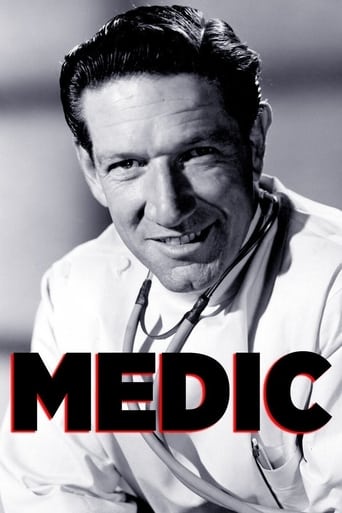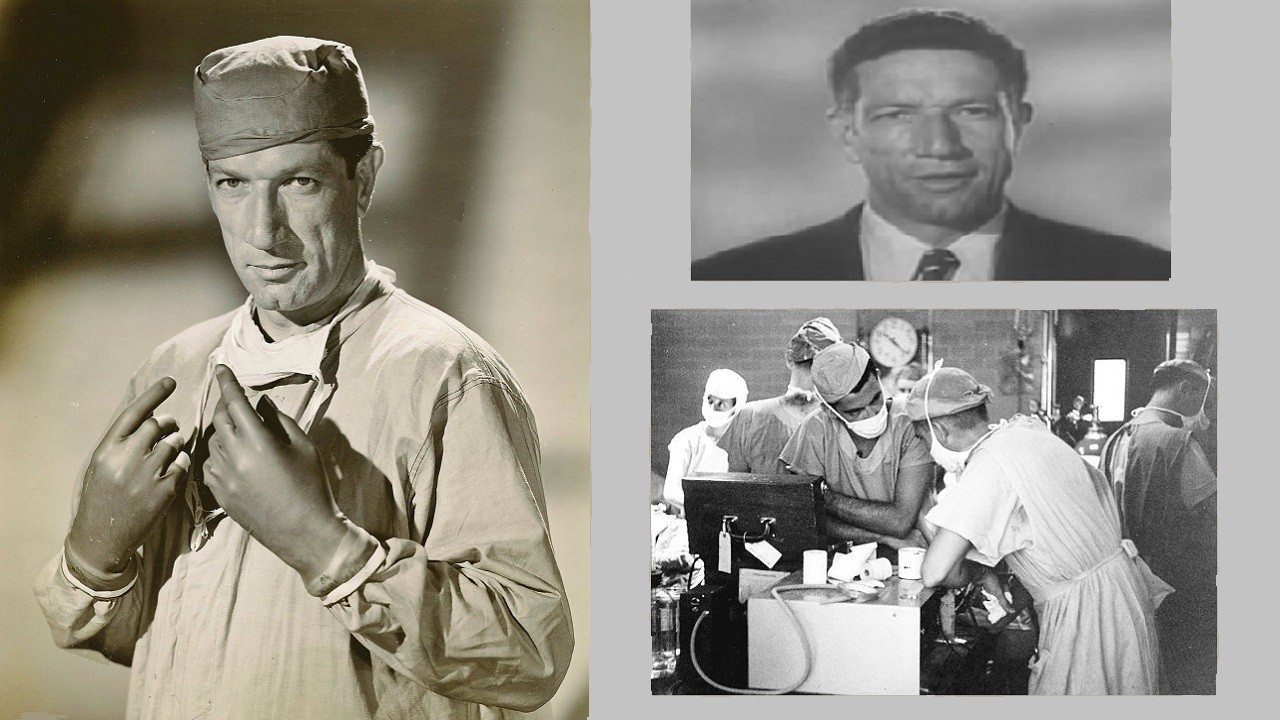

Medic is an American medical drama that aired on NBC beginning in 1954. Medic was television's first doctor drama to focus attention on medical procedures. Created by its principal writer James E. Moser, Medic tried to create realism which would typify medical shows from then on. Moser had previously written for the radio shows Dragnet and Dr. Kildare. He went on to write the television series Ben Casey.
 AD
AD
All Prime Video
Cancel anytime


Promising 19-year-old ballerina Laurie Allen's 1947 death from cancer becomes a personal obsession for newspaper reporter Joe Bailey, who conducts a series of interviews that he hopes will reveal the true story behind her untimely demise.

It's summer vacation and Jenny is a 12 year old girl with a club foot. Her parents are worried about her "ugly deformity" as they refer to it, and whether anybody will marry her when she's older. They take her to see a specialist to see if he can surgically repair her club foot.

This is the story of a young girl named Mary. She has a weak heart due to a defective heart valve. Doctors race to operate on her after she collapses at a dance she attended with her classmates.

After sending his wife away, Jim falls again and his condition worsens to the point where he decides to undergo experimental surgery on his spine.

A man develops a crippling arthritic spinal condition.

Dr. Styner stops to help a married couple involved in an automobile accident, but finds himself on trial for medical malpractice when the wife subsequently and surprisingly becomes addled and partially paralyzed on her left side.

Navy surgeon saves life of sailor injured in sea explosion.

A father, grateful to a doctor for saving his daughter's life, offers to finance the much-needed equipment for his office.

Although resigned to the fact that he had an incurable heart ailment, a man is badgered by his wife into going to a doctor. Tonight's story concerns radiology, and viewers see the UCLA medical center and its cancer-treating cobalt bomb.

An arrogant and self-aggrandizing singer's relentless drive for success is unceremoniously halted when he learns that his hoarseness is not due to vocal overwork, but to a potentially malignant cancer of the larynx.

An old man is the only family left for his crippled grandson. He's worried about his ability to carry on, and after a painful heart incident, he's convinced he'll soon be dead and his helpless charge will be doomed, so he decides they should go together and leaves the gas pipe open as they sleep.

This is the story of years of research to discover the cause of blindness in prematurely born infants.

A troubled woman has given birth to a baby by Caesarian section and has lost the will to live. She is put in the care of nurse Clara Mary Gallagher, who is retiring the next day after 39 years of service.

This is the story of Alexis St. Martin, a young fur trapper who was shot in the side and was used by Dr. William Beaumont for research into the function of the human digestive system.

Leprosy victim Allan Connolly is finally pronounced healthy and fit to resume a productive life in normal society, but he and his wife are unprepared for the rejection and irrational fear evinced by their friends and neighbors.

A successful photographer's model is told she is a victim of multiple sclerosis. Her unsympathetic husband decides he now wants a divorce.

An elderly judge who has no close relatives is taken seriously ill. After he collapses, his ailment is diagnosed as a pancreatic tumor.

Due to circumstances at home, a young man needs to help take care of his mom and ailing father. He can't finish college and resorts to Professional Wrestling to make money. Can he restore his appearance and his dignity?

The story of the contribution of the anesthesiologist to medicine. An elderly woman must undergo a thyroid operation. A large part of the success of such an operation is in the deft hands and decisions of the anesthesiologist.

During World War Two, pilots are able to take aircraft higher and higher, but they keep fainting out when parachuting out. A young doctor proceeds to do experiments back in the states on the most likely of these pilots to falter. Controlled high altitude simulations prove dangerous, but necessary.

A county coroner's investigation will exonerate or incriminate a distraught spinsterish woman who was alone with her younger sister's baby boy when the infant died suddenly and unexpectedly.

Comic strip artist Dick Hooper does a nationally syndicated feature called "Salty", but he can't make his due dates for finished cartoons because he's become obsessed with germs and various muscle and stomach pains that doctors can't locate. He's become a raging hypochondriac that's about to lose his wife and career.

Little known but true story about an Army doctor who tried to save Abraham Lincoln's life. Dr. Charles A. Leale was in the audience at Ford's Theater when John Wilkes Booth fired the fatal shot at President Lincoln. For 12 hours Leale and two other doctors worked desperately against death.

A citrus farmer gets married at age 45. He then wants a son but is unable to have one. He visits the doctor to get help.

Dr. Styner offers advice and support when a 17-year-old track star develops severe acne and chronic fatigue due to stresses caused by his demanding mother's determination to see him achieve his father's dream of Olympic stardom.

When Gwen Kellogg becomes depressed, modern treatment helps restore her to health

A young boy, neglected by his wealthy parents, builds a dream world of his own with the help of his tattered teddy bear, Mr. Bodine. This aggravates his asthmatic condition, as he is allergic to the teddy bear.

After unsuccessfully attempting to kill her baby, Frances Dunbar voluntarily admits herself to a state psychiatric institution where she receives treatment that slowly helps her to realize the reasons for her troubled mental state.

Immediately after giving birth to her fourth child, Frances Dunbar develops a severe case of postpartum depression and becomes convinced that she can (and will) violently murder the baby.

Unaware that he has developed diabetes, a struggling young prizefighter who is also a gifted artist endangers his life by continuing to push himself in order to earn the money needed to further his education.

Pretty, young Helen has a collapsing colon. Unless she consents to surgery to open up a new elimination canal and container bag, she will die. But what will that mean to a young woman's self-image and life style. Daring topic for its time.
Medic is an American medical drama that aired on NBC beginning in 1954. Medic was television's first doctor drama to focus attention on medical procedures. Created by its principal writer James E. Moser, Medic tried to create realism which would typify medical shows from then on. Moser had previously written for the radio shows Dragnet and Dr. Kildare. He went on to write the television series Ben Casey.
The tv show is currently not available onine